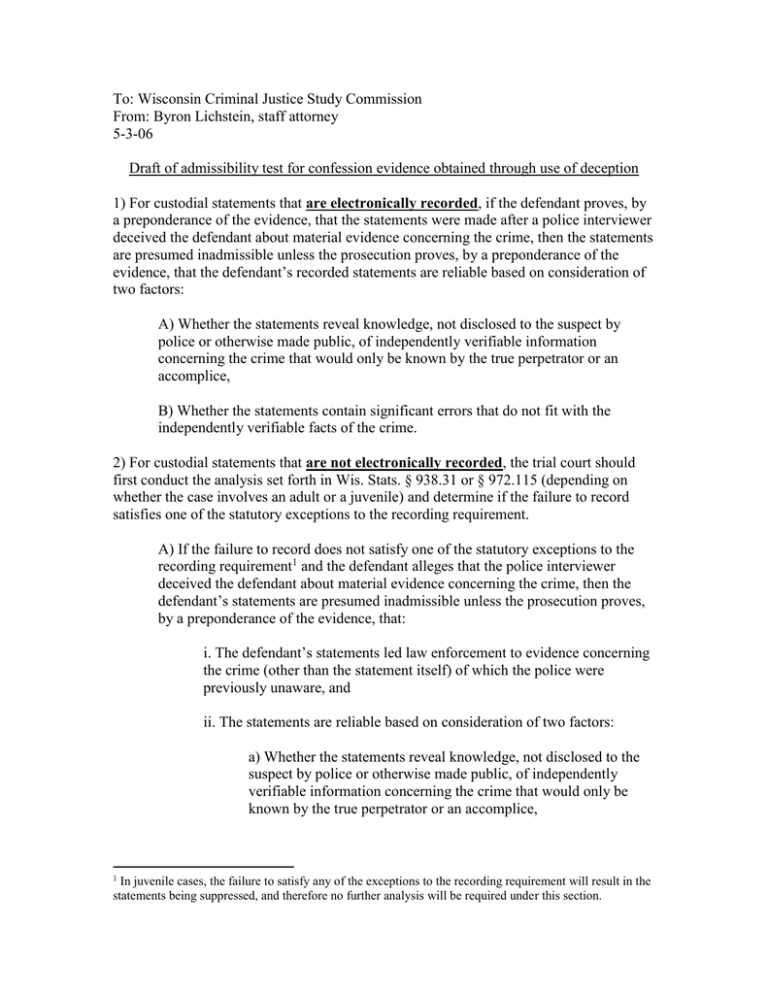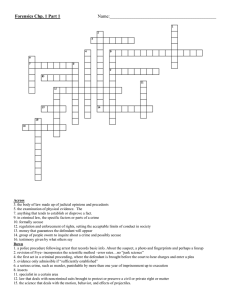To: Wisconsin Criminal Justice Study Commission From: Byron Lichstein, staff attorney 5-3-06
advertisement

To: Wisconsin Criminal Justice Study Commission From: Byron Lichstein, staff attorney 5-3-06 Draft of admissibility test for confession evidence obtained through use of deception 1) For custodial statements that are electronically recorded, if the defendant proves, by a preponderance of the evidence, that the statements were made after a police interviewer deceived the defendant about material evidence concerning the crime, then the statements are presumed inadmissible unless the prosecution proves, by a preponderance of the evidence, that the defendant’s recorded statements are reliable based on consideration of two factors: A) Whether the statements reveal knowledge, not disclosed to the suspect by police or otherwise made public, of independently verifiable information concerning the crime that would only be known by the true perpetrator or an accomplice, B) Whether the statements contain significant errors that do not fit with the independently verifiable facts of the crime. 2) For custodial statements that are not electronically recorded, the trial court should first conduct the analysis set forth in Wis. Stats. § 938.31 or § 972.115 (depending on whether the case involves an adult or a juvenile) and determine if the failure to record satisfies one of the statutory exceptions to the recording requirement. A) If the failure to record does not satisfy one of the statutory exceptions to the recording requirement1 and the defendant alleges that the police interviewer deceived the defendant about material evidence concerning the crime, then the defendant’s statements are presumed inadmissible unless the prosecution proves, by a preponderance of the evidence, that: i. The defendant’s statements led law enforcement to evidence concerning the crime (other than the statement itself) of which the police were previously unaware, and ii. The statements are reliable based on consideration of two factors: a) Whether the statements reveal knowledge, not disclosed to the suspect by police or otherwise made public, of independently verifiable information concerning the crime that would only be known by the true perpetrator or an accomplice, 1 In juvenile cases, the failure to satisfy any of the exceptions to the recording requirement will result in the statements being suppressed, and therefore no further analysis will be required under this section. b) Whether the statements contain significant errors that do not fit with the independently verifiable facts of the crime. B) If the failure to record satisfies one of the statutory exceptions to the recording requirement and the defendant proves, by a preponderance of the evidence, that the police interviewer deceived the defendant about any material evidence concerning the crime, then the statements are presumed inadmissible unless the prosecution proves, by a preponderance of the evidence, that the statements are reliable based on consideration of two factors: i) Whether the statements reveal knowledge, not disclosed to the suspect by police or otherwise made public, of independently verifiable information concerning the crime that would only be known by the true perpetrator or an accomplice, ii) Whether the statements contain significant errors that do not fit with the independently verifiable facts of the crime.


